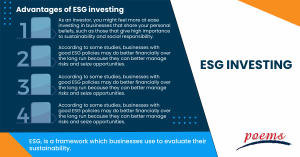ESG investing
Table of Contents
ESG investing
Today’s conscious investors are looking for businesses with a sustainable foundation. Companies that can withstand the worst effects of any crisis and consistently factor in the environment, society, and governance (ESG) are in high demand. ESG investing prioritises the ESG variables or outcomes when making investment decisions.
What is ESG investing?
ESG, is a framework which businesses use to evaluate their sustainability. Environmental considerations centre on ecological protection; social considerations examine how a company treats its employees and the community; and governance considerations examine how a corporation is administered.
After considering ESG factors, ESG investing assesses an investment’s financial returns and overall impact. An investment’s ESG score measures the sustainability of investment in those specific categories.
Understanding ESG investing
Companies that adhere to sound ESG principles are the focus of ESG investing. ESG is an exciting growth sector with good consequences for society and the environment, as investors are becoming keener to align their portfolios with ESG-related companies and fund providers.
With the concept becoming a crucial component of many institutional investors’ playbooks, ESG is now mainstream. A rising number of ESG rating agencies issue ESG ratings, as well as new and developing reporting formats, all of which enhance the transparency and consistency of the ESG information that corporations disclose publicly.
How does ESG investing work?
For ESG investing, a company’s environmental disclosure, environmental effect, and any measures to reduce pollution or carbon emissions are considered ecological factors. Social relations relate to management, diversity, and human rights prevalent in the workplace. This also covers any connections to the neighbourhood, such as philanthropy and corporate citizenship.
Conversely, governance considers the relationship between the management and shareholders and shareholder rights and compensation. An organisation can sustain strong credibility or reputation by implementing sound ESG practices. Also, it has a lower risk likelihood because sustainability is one of their guiding principles. As a result, the company experiences consistent and longer-lasting performance over time.
On the other hand, organisations who do not follow ESG priciples, can suffer the long-term danger of instability, high risks, and a greater chance for unexpected losses. One-fourth of all professionally managed assets globally are in the ESG category.
Advantages of ESG investing

The advantages of ESG Investing are:
- As an investor, you might feel more at ease investing in businesses that share your personal beliefs, such as those that give high importance to sustainability and social responsibility.
- According to some studies, businesses with good ESG policies may do better financially over the long run because they can better manage risks and seize opportunities.
- Through your investment, you may positively impact society and the environment by choosing companies that prioritise and have good environmental, social, and governance standards.
- Businesses prioritising ESG practices may be better able to handle risks, including those linked to legal issues, reputational issues, risks arising from climate change, and risks arising from other environmental problems.
Disadvantages of ESG investing
The disadvantages of ESG Investing are:
- The pool of businesses that adhere to ESG standards could be smaller than that of all publicly traded companies. As a result, investors may have fewer investing possibilities.
- There is no commonly agreed standard for establishing which companies are “ESG-compliant,” making it difficult for investors to compare and evaluate different investment possibilities.
- ESG-focused businesses might be more open and accountable to their stakeholders, which could result in better-informed investment choices.
- Companies may have to spend more money on additional research and due diligence if ESG factors are considered throughout the investment process, which could raise the price of investing.
- “Greenwashing” can occur when businesses make claims about their ESG policies but these not completely supported by their deeds and could make finding viable businesses challenging for you as an investor.
- Some investors might be worried that backing businesses with excellent ESG policies could lead to reduced returns. Nonetheless, research has found that organisations with good ESG practices may do better financially over the long term. It may also be challenging to weigh the benefits and drawbacks of various investment possibilities from an ESG perspective if you are a novice investor unfamiliar with this kind of investing.
Frequently Asked Questions
Sustainable investing and ESG differ because ESG may be quantified using established environmental, social, sustainable development, and governance measures.
Several financial institutions have recently released ESG evaluations and scoring systems to identify ESG investments. For example, MSCI has released a rating system that covers more than 8,500 firms globally and assigns them letter grades and scores based on how well they adhere to ESG norms and activities.
ESG is crucial to businesses because it assesses a business’s final value for certain objectives and establishes whether it aligns with an individual’s or other business’s values.
Investors can compare a company’s performance to its rivals in the same industry and companies from other sectors using an ESG score from 0-100. Bad performance is defined as a score of less than 50, and excellent performance as a score of more than 70.
ESG companies employ sustainability strategies and frequently exhibit higher operational effectiveness, cost savings, lower employee turnover, innovation, talent retention, lower compliance costs, and risk management, all of which may contribute to an increase in shareholder value.
Related Terms
- Margin Requirement
- Pledged Asset
- Stochastic Oscillator
- Prepayment risk
- Homemade leverage
- Prime bank investments
- ESG
- Capitulation
- Shareholder service fees
- Insurable Interest
- Minority Interest
- Passive Investing
- Market cycle
- Progressive tax
- Correlation
- Margin Requirement
- Pledged Asset
- Stochastic Oscillator
- Prepayment risk
- Homemade leverage
- Prime bank investments
- ESG
- Capitulation
- Shareholder service fees
- Insurable Interest
- Minority Interest
- Passive Investing
- Market cycle
- Progressive tax
- Correlation
- NFT
- Carbon credits
- Hyperinflation
- Hostile takeover
- Travel insurance
- Money market
- Dividend investing
- Digital Assets
- Coupon yield
- Counterparty
- Sharpe ratio
- Alpha and beta
- Investment advisory
- Wealth management
- Variable annuity
- Asset management
- Value of Land
- Investment Policy
- Investment Horizon
- Forward Contracts
- Equity Hedging
- Encumbrance
- Money Market Instruments
- Share Market
- Opening price
- Transfer of Shares
- Alternative investments
- Lumpsum
- Derivatives market
- Operating assets
- Hypothecation
- Accumulated dividend
- Assets under management
- Endowment
- Return on investment
- Investments
- Acceleration clause
- Heat maps
- Lock-in period
- Tranches
- Stock Keeping Unit
- Real Estate Investment Trusts
- Prospectus
- Turnover
- Tangible assets
- Preference Shares
- Open-ended investment company
- Standard deviation
- Independent financial adviser
- Earnest Money
- Primary market
- Leveraged Loan
- Transferring assets
- Shares
- Fixed annuity
- Underlying asset
- Quick asset
- Portfolio
- Mutual fund
- Xenocurrency
- Bitcoin Mining
- Option contract
- Depreciation
- Inflation
- Cryptocurrency
- Options
- Asset
- Reinvestment option
- Capital appreciation
- Style Box
- Top-down Investing
- Trail commission
- Unit holder
- Yield curve
- Rebalancing
- Vesting
- Private equity
- Bull Market
- Absolute Return
- Leaseback
- Impact investing
- Venture Capital
- Buy limit
- Asset stripper
- Volatility
- Investment objective
- Annuity
- Sustainable investing
- Face-amount certificate
- Lipper ratings
- Investment stewardship
- Average accounting return
- Asset class
- Active management
- Breakpoint
- Expense ratio
- Bear market
- Annualised rate of return
- Hedging
- Equity options
- Dollar-Cost Averaging (DCA)
- Due Diligence
- Contrarian Investor
Most Popular Terms
Other Terms
- Physical ETF
- Initial Public Offering
- Buyback
- Secondary Sharing
- Bookrunner
- Notional amount
- Negative convexity
- Jumbo pools
- Inverse floater
- Forward Swap
- Underwriting risk
- Reinvestment risk
- Final Maturity Date
- Payment Date
- Secondary Market
- Mark-to-market
- Yield Pickup
- Subordinated Debt
- Trailing Stops
- Treasury Stock Method
- Bullet Bonds
- Basket Trade
- Contrarian Strategy
- Exchange Control
- Notional Value
- Relevant Cost
- Dow Theory
- Speculation
- Stub
- Trading Volume
- Going Long
- Pink sheet stocks
- Rand cost averaging
- Sustainable investment
- Stop-limit sell order
- Economic Bubble
- Ask Price
- Constant prepayment rate
- Covenants
- Stock symbol
- Companion tranche
- Synthetic replication
- Bourse
- Beneficiary
- Witching Hour
- Widow and Orphan stock
- Public Float
- Closing Price
- Reverse stock splits
- Quiet period
Know More about
Tools/Educational Resources
Markets Offered by POEMS
Read the Latest Market Journal

Back in Business: The Return of IPOs & Top Traded Counters in March 2024
Start trading on POEMS! Open a free account here! At a glance: Major indices continue...

Weekly Updates 15/4/24 – 19/4/24
This weekly update is designed to help you stay informed and relate economic and company...

From $50 to $100: Unveiling the Impact of Inflation
In recent years, inflation has become a hot topic, evoking strong emotions as the cost...

Japan’s Economic Resurgence: Unveiling the Tailwinds Behind Nikkei 225’s Record Leap
Source: eSignal, Intercontinental Exchange, Inc. In the heart of Japan’s economic landscape, the Nikkei 225...

Weekly Updates 8/4/24 – 12/4/24
This weekly update is designed to help you stay informed and relate economic and...

What Makes Forex Trading Attractive?
In a world where the click of a button can send goods across oceans and...

Weekly Updates 1/4/24 – 5/4/24
This weekly update is designed to help you stay informed and relate economic and company...

How to soar higher with Positive Carry!
As US Fed interest rates are predicted to rise 6 times this year, it’s best...












